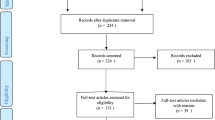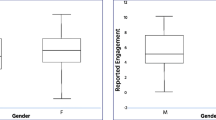Abstract
We describe six hallmarks of high quality service-learning and explain how these considerations guided the development of a Transitional Coaching Program (TCP) during the first three years of implementation. We have demonstrated that the TCP is acceptable, feasible, and sustainable. Improvements have been seen in the degree of impact on learning objectives, but statistically significant change has not yet been achieved. This project highlights the importance of looking beyond satisfaction and engaging in rigorous assessment of learning objectives and ongoing quality improvement through attention to best practices and evidence-based, continuous quality improvement.
Similar content being viewed by others
References
Bandura, A., & Barbaranelli, C. (1996). Multifaceted impact of self-efficacy beliefs on academic functioning. Child Development, 67(3), 1206–1222.
Bowman, N. A. (2010). Can 1st-year college students accurately report their learning and development. American Education Research Journal, 47(2), 466–496.
Bringle, R. G., & Duffy, D. K. (1999). With service in mind: Concepts and models for service-learning in psychology. Sterling, VA: Stylus.
Butin, D. W. (2006). The limits of service-learning in higher education. The Review of Higher Education, 29(4), 473–498.
Cohen, J. (1992). A power primer. Psychological Bulletin, 112(1), 155–159.
Díaz–Gallegos, D., Furco, A., & Yamada, H. (1999). The higher education service–learning surveys. Berkeley, CA: University of California–Berkeley. Accessed January 3, 2011 from: www.servicelearning.org/filemanager/download/HEdSurveyRel.pdf
Duffy, D. K., & Bringle, R. G. (2006). Collaborating with the community: Psychology and service-Learning. In D. K. Duffy & R. G. Bringle (Eds.), With service in mind: Concepts and models for service-learning (pp. 1–18). Sterling, VA: Stylus.
Duncan, D., & Kopperud, J. (2008). Service-learning companion. Boston, MA: Houghton Mifflin.
Embry, D., & Biglan, T. (2008). Evidence-based kernels: Fundamental units of behavioral influence. Clinical Child and Family Psychology Review, 11(1), 75–113.
Eyler, J., Giles, D. E. J., & Braxton, J. (1997). The impact of service-learning on college students. Michigan Journal of Community Service-learning, 4(1), 5–15.
Eyler, J., Root, S., & Giles, D. E. J. (2006). Sevice-learning and the development of expert citizens: Service-learning and cognitive science. In R. G. Bringle & D. K. Duffy (Eds.), With service in mind: Concepts and models for service-learning in psychology (pp. 85–100). Sterling, VA: Stylus.
Gordon, V. P. (1989). Origins and purposes of the freshman seminar. In M. L. Upcraft & J. N. Gardner (Eds.), The freshman year experience (pp. 183–197). San Francisco, CA: Jossey-Bass.
Karcher, M. J. (2005). The effects of developmental mentoring and high school mentors’ attendance on their younger mentees self-esteem, social skills, and connectedness. Psychology In The Schools, 42(1), 65–77.
Karcher, M. J., & Sass, D. (2010). A multicultural assessment of adolescent connectedness: Testing measurement invariance across gender and ethnicity. Journal of Counseling Psychology, 57(3), 274–289.
Kaye, C. B. (2004). The complete guide to service-learning: Proven, practical ways to engage students in civic responsibility, academic curriculum, and social action. Minneapolis, MN: Free Spirit.
Kitzrow, M. A. (2006). An overview of curent psychological theory and research on altruism and prosocial behavior. In R. G. Bringle & D. K. Duffy (Eds.), With service in mind: Concepts and models for service-learning in psychology (pp. 19–34). Sterling, VA: Stylus.
Miller, W. R., & Rollnick, S. (2002). Motivational interviewing: Preparing people for change. New York, NY: Guilford.
Miller, J., Janz, J., & Chen, C. (2007). The retention impact of a first-year seminar on students with varying pre-college academic performance. Journal of the First-year Experience and Students in Transition, 91(1), 47–62.
Potts, G., & Schultz, B. (2008). The freshman seminar and academic success of at-risk students. College Student Journal, 42(2), 647–658.
Stavrianopoulos, K. (2008). Service-learning within the freshman year experience. College Student Journal, 42(2), 703–712.
The Institute for Educational Sciences (2009). Impact evaluation of the U.S. Department of Education’s student mentoring program, final report (NCEE, 2009-4047). [Online document]. Retrieved January 3, 2011 from http://ies.ed.gov/ncee/pubs/20094047
Tinto, V. (1993). Leaving college: Rethinking the causes and cures of student attrition (2nd ed.). Chicago, IL: University of Chicago.
Wandersman, A., Imm, P., Chinman, M., & Kaftarian, S. (2000). Getting to outcomes: A results-based approach to accountability. Evaluation and Program Planning, 23(3), 389–395.
Author information
Authors and Affiliations
Corresponding author
Rights and permissions
About this article
Cite this article
Smith, B.H., Gahagan, J., McQuillin, S. et al. The Development of a Service-Learning Program for First-Year Students Based on the Hallmarks of High Quality Service-learning and Rigorous Program Evaluation. Innov High Educ 36, 317–329 (2011). https://doi.org/10.1007/s10755-011-9177-9
Published:
Issue Date:
DOI: https://doi.org/10.1007/s10755-011-9177-9




